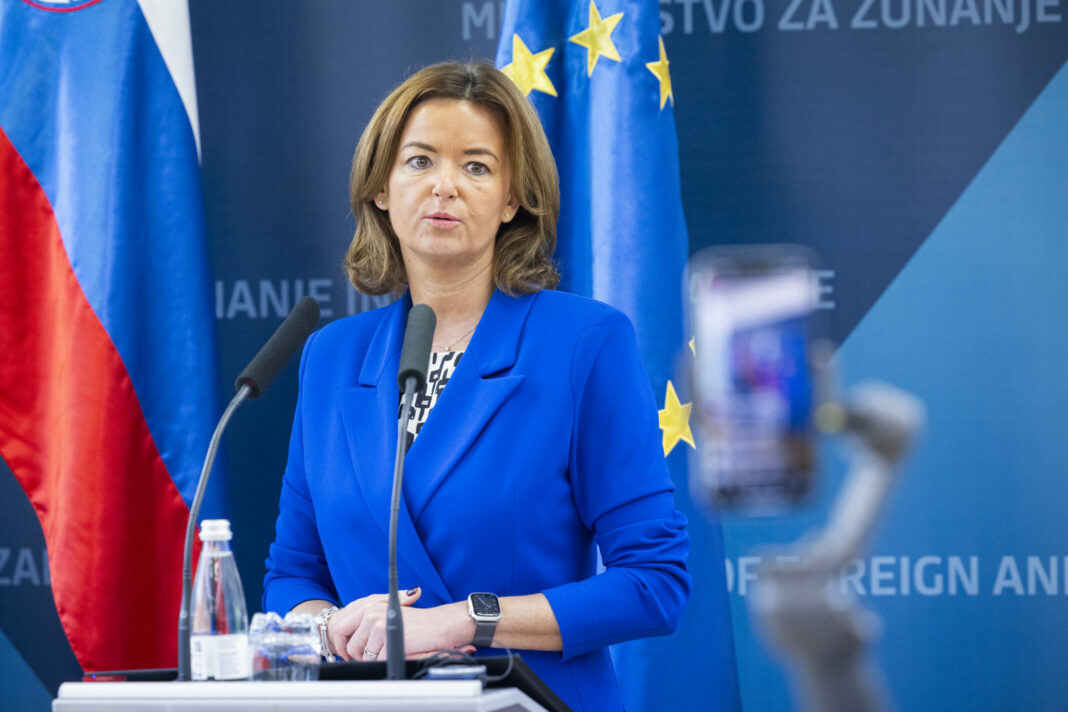By: G. B.
Slovenia is monitoring developments in Bosnia and Herzegovina, said Foreign Minister Tanja Fajon today regarding the possible introduction of sanctions against the President of Republika Srpska, Milorad Dodik. “From Slovenia’s standpoint, I can say that all options are on the table,” she stated after the meeting of EU foreign ministers in Luxembourg.
So, according to Foreign Minister Tanja Fajon’s wording, Slovenia – at least for now – does not intend to act against the controversial leader of Republika Srpska, Milorad Dodik, while at the same time avoiding direct answers.
They are merely “monitoring” the situation, without taking any concrete decisions
“For now, we are monitoring the situation. We are watching how things will unfold,” Fajon replied when asked whether Slovenia anticipates a discussion about imposing sanctions on Dodik, following the decisions by Germany and Austria to do so due to his secessionist rhetoric. She added that she would like to see unified action from the EU on this issue.
According to her, during today’s meeting in Luxembourg, EU foreign ministers discussed developments in the Western Balkans, but did not address the issue of sanctions. “From Slovenia’s standpoint, I can say that all options are on the table. It is important to respect the law and the independence of the judiciary, and that is how we will proceed going forward,” the foreign minister explained. In her discussion with ministerial colleagues, she also noted that Dodik’s willingness to engage in dialogue “is not exactly apparent.”
Earlier in the day, upon arriving at the meeting, Minister Fajon expressed concern over the situation in Bosnia and Herzegovina, especially over secessionist rhetoric, which she said harms the country’s path toward EU membership.
Bosnia and Herzegovina is currently facing one of the most severe political and judicial crises since the war, following a February ruling that sentenced Milorad Dodik to one year in prison and a six-year ban from political activity for ignoring decisions of the High Representative of the international community in BiH, Christian Schmidt. In response, authorities in Republika Srpska passed several constitutionally controversial laws.
Janković is in the background
Naturally, none of the mainstream media are willing to question this disgraceful posture. However, the portal Istraga.ba has learned that it is in fact Fajon – in connection with Zoran Janković – who is blocking sanctions against Dodik. According to the portal, the Slovenian Ministry of Foreign Affairs opposes the imposition of sanctions but does not want to say so publicly. The main lobbyist in this regard is said to be Janković, who allegedly wants to maintain his supposedly good relations with both Dodik and Serbian President Aleksandar Vučić.
To recap: Germany and Austria have imposed sanctions against Milorad Dodik, Nenad Stevandić, and Radovan Višković. These two EU countries acted unilaterally because consensus on EU-level sanctions was not reached in Brussels. As a result, they banned the three individuals from entering their territories. Similar sanctions may soon be introduced by the Netherlands, possibly along with one or two other countries, as part of a “flood of sanctions” announced by BiH’s Foreign Minister Elmedin Konaković.
There is little doubt that Janković is currently the most influential political figure in Slovenia – even Prime Minister Robert Golob must follow his lead. That is why Janković’s letter to Vučić earlier this year caused a lot of discontent, but no real action. Back in September 2022, during the general election campaign, Janković publicly supported Milorad Dodik. “I hope the president wins and that we will establish cooperation. True friendship shows in difficult times, and the situation in Europe is not easy. I wish him all the best,” Janković said at the time.
It is also telling that last fall, Fajon received the key to the city of Sarajevo – a symbolic honour recognising her contribution to the development and preservation of civilisational values or to world peace. In a way, it is a slap in the face to Bosnia and Herzegovina’s stability.

